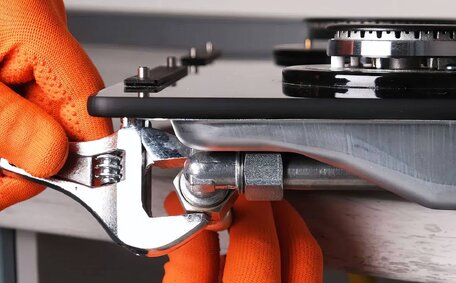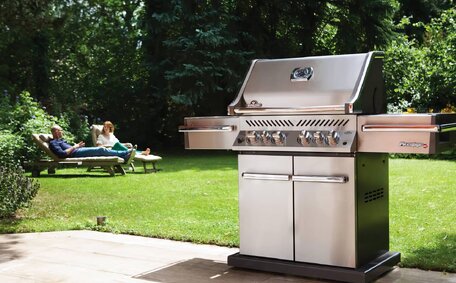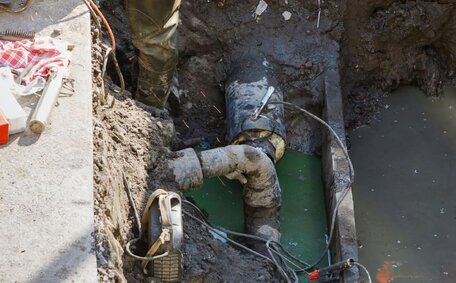
The role of gas fitting in kitchen renovations
When renovating your kitchen, it’s important to engage a licensed gas fitter to safely install, replace or alter any gas appliances and pipes. This ensures
Read MoreGas lines provide an efficient source of fuel to power heating systems, water heater units, and other appliances in homes and businesses. However, issues with gas lines can pose extreme hazards, requiring immediate attention from licensed professionals.
Potential dangers of compromised gas lines include leaks, explosions, carbon monoxide poisoning, and fires.
A gas leak can not only release toxic fumes but also pose a serious risk to the safety and integrity of your building. Symptoms of a gas exposure affecting your house include dizziness, nausea, and irritation to eyes and throat.
If you suspect your gas system has issues, it’s critical to act fast. immediately turn off the gas supply valve and evacuate your premises or any affected area. Call a licenced gas fitter to inspect all gas lines and appliances, or hire a professional for gas line repair services. Only professionals have the expertise to accurately identify and repair gas issues, ensuring the safety of your residence or business.
This article will cover your natural gas questions and concerns:
Stay alert to unusual smells or signs from gas appliances and contact gas experts immediately. Swiftly addressing gas problems can prevent potential catastrophic incidents.
There are several potential signs that your gas line needs immediate attention due to damage or leaks:
If you notice any of these warning signs, it’s clear your gas lines need a professional gas fitter to inspect immediately. Continuing to use appliances when your gas line could need repair may result in dangerous gas buildup, explosions and carbon monoxide poisoning.
Natural gas itself has no odour natural gas is odourless, but an added “rotten egg” smell from Mercaptan serves as a critical safety feature. If you detect a persistent gassy sulphur or rotten egg odour near your gas appliances or lines, this likely means gas is escaping.
This makes gas leaks quickly detectable through smell before gas concentrations reach explosive levels.
It is crucial to act immediately if you smell gas with this odorant. The strength of the smell often correlates with the size of the leak. Trust your nose – respond to potential gas odours without any hesitation.
Any “rotten egg” odour means you have a gas leak and should evacuate the building while calling an emergency gas fitter.
Note the smell before leaving so you can describe it accurately to professionals. Use your nose to detect where the gas odour is strongest to help locate the leak source. With gas leaks, every second counts for your safety, knowing that your gas line could be at risk compels swift action.
In addition to unusual odours, be attentive to any hissing, whistling, or roaring sounds around gas appliances or lines. These sounds often indicate common problems such as gas leaks or line breaches. The sounds may be subtle, so pay close attention.
A hissing sound signals gas rapidly escaping from a line at high pressure. A whistling or high-pitched squeal near a gas pipe may signal that a small leak can be present.
Use your ears to check your surroundings for the source of the sound. This can help identify the location of the leak when a service technician arrives. Note any small sounds you might otherwise dismiss - Even a minor hiss can indicate a serious hazard.
For gas safety, rely on all your senses. If you smell rotten eggs or hear odd noises near your gas lines, act quickly. Call our team at Cecil Hills Plumbing for urgent assistance to shut off your main gas and inspect for damage.
One warning sign that may indicate an underground gas leak is unexplained changes in vegetation health. Gas leaks, possibly due to issues like tree roots, can interrupt the nutrients and oxygen that plants on your property need, causing grass to brown, shrubs to wilt, or otherwise healthy plants to die off.
Pay attention to the vegetation surrounding your gas lines or appliances. If you notice any unusual discolouration, drying leaves, or dead patches in your plants for unknown reasons, it could signify an unseen gas leak. The vegetation impacts may be more noticeable concerning the lines your property hosts.
Gas leaks pose a safety hazard and can significantly damage your underground pipe infrastructure over time. If you observe strange vegetation changes without another cause, call a gas fitter to inspect for leaks right away. The sooner any issues that need repaired are addressed, the less risk of escalation and the lower your repair costs will be.
Exposure to leaking natural gas or a gas line blockage can cause concerning health symptoms, requiring a call to a plumber. Pay attention to any flu-like symptoms that arise without explanation, especially if other signs of a gas leak are present:
These symptoms typically increase in severity the longer you are exposed to gas leaks. If anyone experiences these symptoms and a natural gas line leak is suspected, evacuate immediately and call an emergency repair technician. Lingering gas exposure can jeopardize your health, potentially causing long-term effects over time.
Do not attempt to self-diagnose what issue can make your gas system malfunction or continue using leak-prone gas appliances. Our licenced gas fitters have specialised equipment to detect leaks and ensure all repairs meet strict safety codes. Trust the experts to address any gas line hazards in your home or business, ensuring gas your environment remains safe.
Damaged or leaking gas lines can cause issues with appliances relying on natural gas to operate. Symptoms most likely include:
Such issues are typically due to blockages or leaks that restrict the proper flow of gas. Over time, such strain can damage appliance components and lead to carbon monoxide production from inefficient combustion.
Your monthly gas bill might also reflect the impact of leaks with heightened charges. Gas leaks allowing fuel loss can spike monthly costs. Compare recent bills to verify, as a jump may signal leaks.
If you’re experiencing appliance irregularities or unexpected bill increases, this could signal a need for a gas line inspection. Our technicians inspect all fittings, valves, and pipes, locating leaks to resolve issues and ensure smooth operations.
Regular maintenance can prevent issues with gas pipes. We offer preventative maintenance to proactively avoid issues. Schedule inspections to keep lines leak-free and household appliances running safely and economically.
If your gas appliances are malfunctioning, it may point to an underlying issue with your gas lines. Warning signs include:
These issues may arise when gas lines need line repair due to causing insufficient fuel flow. Over time, a restricted gas line can strain appliance components, produce incomplete combustion and carbon buildup, and present safety issues.
Don’t ignore these red flags; consult a line repair service for a professional assessment.
Contact a professional licenced gas fitter to inspect your entire home’s gas line system. We’ll check all lines, valves and fittings supplying your appliances. If leaks or blockages are disrupting proper gas flow in the line your appliances are connected to, we’ll repair these issues promptly and restore reliable operation.
Inexplicably high energy bills can be a symptom of a gas leak. If your gas usage habits haven’t changed but bills are spiking, this often signals that gas is escaping from your system undetected.
Compare recent gas utility bills to verify if they reflect an abnormal rise due to a issue with your home’s gas infrastructure. While factors like weather do have their impacts, a significant leap in gas usage than normal could confirm leaks allowing precious fuel loss.
If you’re unable to identify the cause behind increased bills and suspect a gas leak, don’t delay - call our licensed gas fitters. We’ll check metre readings and equipment for abnormalities. If a leak exists, we can find and seal it promptly to stop preventable gas waste.
Take action as soon as possible for maximum savings. The longer leaks persist, the more utility dollars needlessly drain. We’ll get your gas lines fully functional again, eliminate leakage fuelling higher bills, and discuss leak prevention steps.
If you notice any concerning signs of a potential gas line repair issue, it is crucial to call a licenced professional right away. We are available 24/7 to respond to gas leak emergencies and thoroughly inspect your gas infrastructure.
Call our emergency hotline immediately if you detect a very strong gas odour or hear loud hissing near your home gas line or appliances. We have an on-call team ready to despatch technicians urgently to ensure safety.
For other issues like pilot lights repeatedly going out, signs of vegetation damage, or unexplained health symptoms, we still recommend calling us ASAP for prompt assessment. Only professional technicians have the expertise and toolsets to identify leaks and rectify line problems their specialised skills.
When you call Cecil Hills Plumbing, we will advise you on next steps while we mobilise a truck. This may include evacuating the area, avoiding ignition sources, and refraining from turning appliances on or off while you call your local expert. Our licenced gas fitters will also provide emergency plumbing services if a leak is discovered.
Don’t hesitate to call professional help at (1300 349 338) whenever a gas line problem is suspected. Timeliness is crucial with gas leaks, so we have staff ready 24/7. Describe the issues accurately so we can prioritise our response and investigate issues efficiently once arriving onsite.
Safety first calls for rapid response by qualified experts.
If signs of a gas line issue are present, it’s critical to have your lines thoroughly inspected and any damage professionally repaired. Our licensed technicians provide professional repair service utilising advanced equipment to diagnose leaks or other issues.
We first run procedures to detect gas leaks along all lines and pipe joints using sensitive handheld detectors that can identify leaks undetectable by smell. Highly accurate electronic "sniffing" devices are traced along the pipes. We also test appliance connections and perform a complete system pressure check to identify any drops signalling escapes.
In addition, we visually scrutinise the entire supply layout to check pipe condition and fittings. Your local gas experts will examine pipes for corrosion damage or material defects. Our technicians also confirm adequate ventilation inside home settings near appliances, as improper airflow can result in hazardous carbon monoxide accumulation.
If gas lines need attention due to identified leak sources or damage, we determine the safest repair approach. We’ll also repair any high-risk pipe fittings, seals, or joints as needed to restore intact piping defence against rust corrosion and leakage.
Pipe sections containing leaks may need replacement or full relining. All repairs strictly follow gas safety codes.
Gas line issues should only be addressed by qualified personnel. Improper repairs could make problems worse and increase dangers.
Our licenced team has extensive hands-on experience evaluating and fixing gas systems safely. We aim to provide peace of mind, ensuring that your gas network is functional and secure.
If inspections reveal gas line leaks or other irreparable damage, pipe replacement may be needed. Our licensed technicians will assess whether sections can be repaired or if complete replacement is required to meet safety standards.
We’ll discuss whether you need gas line repair services if pipes are decayed or defective. In some cases, relining procedures can renew pipe interiors; otherwise new pipe installations are required. We’ll manage the entire process, coordinating any permits needed and providing transparent quotes for the work.
During replacements, we switch off all appliances and ensure they are disconnected before pipes are removed. New copper, steel, or other lines made from polyethylene that are tested for leaks are then installed according to code. Additionally, we’ll replace couplings, valves, or fittings as necessary, ensuring compatibility with new pipes.
Upgrading outdated galvanised iron or lead pipes also enhances safety. We advise replacing ageing gas infrastructure that lacks proper protective coatings or corrosion resistance. Modern pipe materials reduce future leakage risks.
Our licenced specialists will identify and fix any gas line issues, ensuring reliable and safe results. We guarantee all new system components will perform to highest standards for long-term, leak-free gas delivery to your Sydney home.
When renovating your kitchen, it’s important to engage a licensed gas fitter to safely install, replace or alter any gas appliances and pipes. This ensures
Read MoreGas line repairs require a licensed plumber to locate any leaks, fix damaged pipes and fittings, and properly seal everything to prevent future issues. Contact our emergency plumbers for safe and proper gas line repairs.
Read MoreDuring emergency plumbing situations, crucial safety precautions include turning off the main water supply to prevent flooding, wearing protective gear to avoid injuries, clearing standing water to minimize damage, and calling a licensed professional plumber for assistance.
Read MoreCecil Hills, 2171 NSW
We will call back as soon as possible.




